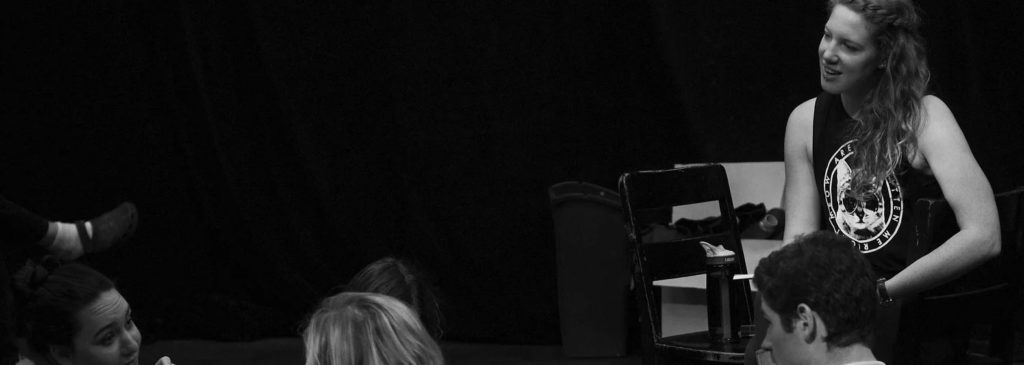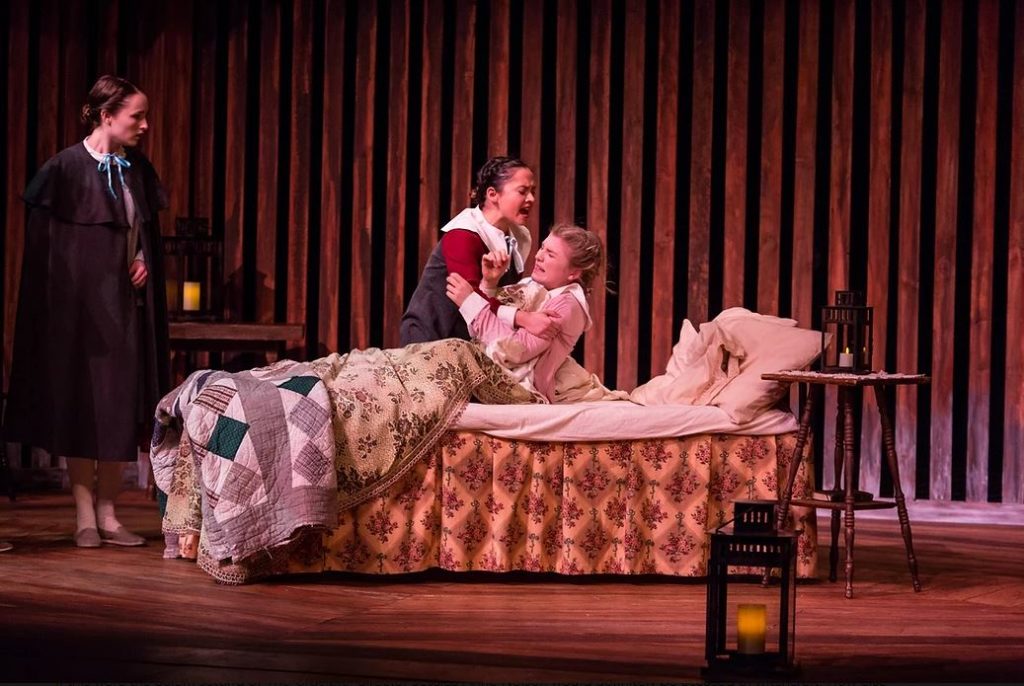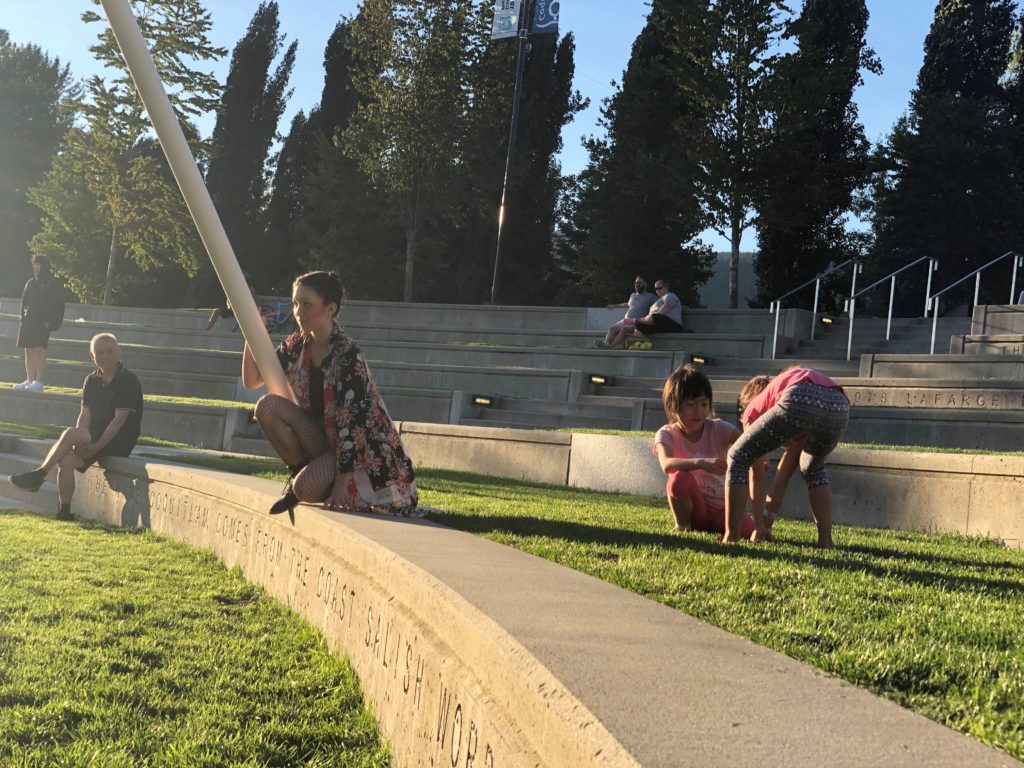 Jessica Anne Nelson is an award-winning theatre director, creator and producer in Vancouver. She has an MFA in Directing and a BA with Honours in Theatre from the University of British Columbia.
Jessica Anne Nelson is an award-winning theatre director, creator and producer in Vancouver. She has an MFA in Directing and a BA with Honours in Theatre from the University of British Columbia.
With a strong background in devised theatre and narrative-based drama, her directing focuses on exploring the range of human experiences, even within the most negatively viewed characters, and exploring how we enact gender in performance and in our daily lives.
As 2019’s Port Coquitlam’s artist-in-residence and she spent her time focusing on creating an immersive experience of her Grandmother’s life growing up on Commercial Drive during the 1940s and ’50s.
This September, Jessica will be directing our Summer Teen Theatre Troupe production of Peter Pan! Find out more about her career as a theatre professional, check out her advice for young artists and some fascinating details regarding this year’s show.

When did you get started as an artist?
I started working as a professional Theater Artist – Creator, Director, and Producer – in 2010. But I’ve been creating and being a part of theatre since I was a child. My mother was an actor in our local community theatre; so growing up I would attend her rehearsals and was captivated by the essence of the live theatre performance. A deep love of theatre began then and I’ve pursued that love ever since.
What drew you to theatre?
When I was younger it was the thrill of performing live in front of an audience. Feeling that connection between my fellow castmates, the audience, and myself, and knowing that each moment in the performance was distinct and fleeting. I loved the fact that I got to live another character’s life for a time and could explore different times, places and situations unlike my own, creating whole new worlds to explore and play within.
How has your work changed over time?
As I grew older I realized that what kept me going back to theatre and why I wanted to pursue it as a career was the impact particular stories could have on an audience and on a community. The theatre performances that were having the greatest impact on me as an audience member were those stories that had a greater purpose than to just entertain. I loved the feeling that the performance left a significant impact on how I viewed the world and opened my eyes to social injustices and different lived experiences than my own. A great performance can challenge biases. I wanted to leave the theatre being challenged and provoked to make a change in my own life and in the lives of my community. I think this is why as I grew into my artistry as a Director, Creator, Producer and now Intimacy Choreographer, I choose to work on scripts and performances that address an important social topic or injustice; something that needs a greater reckoning in our current society and needs to change. I want to create theatre performances that challenge an audience member’s held beliefs and have them leaving the theatre provoked to change or discover more. I believe the shared experience of all of us as human beings in a space together, breathing the same air, going through the same journeys and perhaps challenging emotions or ideas can create positive change in the world and create better, healthier individuals. Because of this great desire for social justice in theatre and performances, I’d say that my work over time has become increasingly focused on those kinds of stories. As my parents always joke, “Jessica why are all of your shows so dark? When are you going to do a comedy?”
I loved the feeling that the performance left a significant impact on how I viewed the world and opened my eyes to social injustices and different lived experiences than my own.
Who inspires you? Who are other artists doing great work today?
Currently, I am inspired by the artist Kim Senklip Harvey – she wrote Kamloopa a few years ago and I’m incredibly excited about new works she is creating. I think not only the art she creates but the kind of social/political work she is doing is really inspiring. I’m also completely obsessed with the work from Electric Company Theatre – I don’t think there’s been a single thing of theirs that I haven’t loved – and I really admire the work of Lois Anderson, Chelsea Haberlin, Ashlie Corcoran and Tara Cheyenne Friedenberg.

Why did you choose Peter Pan as the production this year?
I chose Peter Pan because of certain themes that run through the play and because I believe youth and adults can relate to it now more than ever during a worldwide pandemic. In J. M. Barrie’s story of Peter Pan, Peter has an aversion to being touched. He says that he mustn’t be touched, that no one must ever touch him, but that he doesn’t know why this is. Peter, according to J. M. Barrie, is never touched by anyone in his play. It is incredibly sad to think that a lost young child is afraid to be touched, and would not have that human physical connection with someone else. This connects with our current circumstances when the leaders of the world (Governments, Health Officials) are telling us all that we need to avoid physical contact with one another – to stay 6 ft. apart if you want to avoid getting sick, or making others sick.
For myself, I want to consider what we can learn from Peter Pan and I’m excited by what the Summer Teen Theatre Troupe has done regarding this aspect of the original story and adapting it into our version. In the play, there are also themes of isolation, of wanting to belong and not wanting to grow up – which are things that the youth of today connect with strongly. When speaking with the Troupe, some feel that iconic teen experiences have been taken from them or drastically changed due to the pandemic such as graduation, prom, starting college in the Fall. I think that by using the story of Peter Pan, the youth actors have an opportunity to put out how they are feeling, thinking and what their future might look like after COVID-19. It is incredibly exciting for me to think about what it means to be a company of actors in isolation rehearsing Peter Pan during a worldwide Pandemic!
How has COVID-19 changed the production? Are there any benefits?
COVID-19 is actually one of the main reasons that we ended up going with Peter Pan as our play. Yes, there are still some major challenges with rehearsing and creating a performance during a pandemic, but the creative team and I also find these challenges to be exciting opportunities. Sometimes having restrictions put upon us can create some extraordinary work and allow us to take creative risks that we otherwise wouldn’t have done. I think the restrictions that we’re having to adhere to are giving these youth the benefit of exposing them to a world of filming that they might not have been familiar with before. Also, the youth actors have been the ones to write and adapt the script for our version of Peter Pan giving them a chance to experiment with writing and creating a performance as well.

What is something you like to impart to the Summer students?
I hope that this summer’s experience inspires the students to make their own creative work in the future, and ignites a passion for theatrical performances and storytelling. I want them to know that even with facing an uncertain future in the performing arts, that pursuing a life as an artist is a worthy goal in life. And I truly believe that art, storytelling and our desire to connect with one another is what will keep theatre going through this pandemic and into the future – even if it means that the ‘normal’ way we do things has to change.
What advice would you give a young person who wants to make a career as an artist?
- You have to be strong. A career in the arts will have many ups and downs, and you have to rely on your own perseverance and passion for the art and storytelling to keep going down this path.
- Know that the other artists in your community are there as support, not as competition. One of the greatest challenges I think we face in North America is the idea that I have to be better than everyone else. This can be such a killer. It can make you doubt yourself; compare yourself to other artists, when really those people will gladly help you if you ask for it. Don’t be afraid to seek out those artists you really admire and try to learn from them, rather than comparing yourself, your work, or your successes to theirs.
- Try to have a work-life balance of some kind. Theatre is one of my greatest loves. It feeds my soul and inspires me. But what happens when a pandemic hits and the art that I love so much has been put on hold or moved online? It’s still the art that I’m willing and wanting to do, but it’s not the same as the live and in-person experience that I love. So, you have to make sure that there are other amazing things in your life that you are equally excited about and that can fill you with joy, love and inspiration.